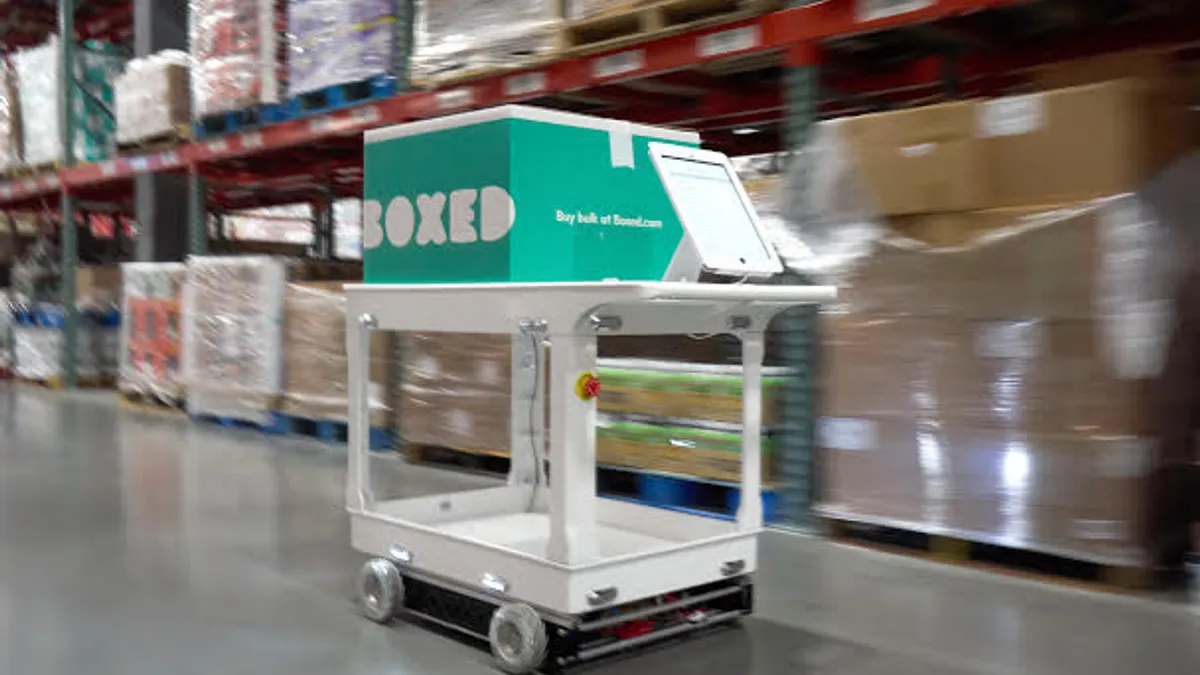Dive Brief:
- Kroger and several other retailers are currently mulling or have submitted bids to acquire online bulk retailer Boxed, according to Forbes, citing anonymous sources. Kroger, the site noted, turned in the first bid and is in pole position for the buy. Other possible suitors include Target and Aldi. Initial offers range from $325 million to $500 million.
- Launched in 2013, Boxed was most recently valued at $470 million during a funding round last January. The company raised $100 million at that time, and currently sees yearly sales of $100 million.
- Private label accounts for 20% of Boxed's sales, while a business-to-business channel that serves clients like United Airlines and Charity Water has seen triple-digit growth in recent years, and now also accounts for 20% of the business. Boxed sells around 1,600 products through its website and mobile app, with many prices below club competitors like Costco and Sam's Club due to exclusive deals it makes with suppliers.
Dive Insight:
Boxed has gone from $8 million in yearly sales to $100 million in three years, making it one of the most watched startups in retail. But it's the future growth potential of this online bulk provider that has possible acquirers so excited.
Originally intended to serve millennial urbanites that didn't have a Costco or a Sam's Club nearby, Boxed has seen orders increasing from a wide range of locations and demographics, including suburban and rural consumers. For as many club stores as the U.S. has, they're not everywhere — and now there are even less, with last week's sudden 10% reduction in Sam's Club stores.
Private label has become a big business for Boxed, which focuses on high-velocity categories. "The amount of volume we do in bath tissue is astounding," Jeff Gamsey, vice president of Boxed's private brands division, recently told the New York Post.
Boxed's B2B channel, meanwhile, is uniquely suited for corporate clients like Delta and Snap. Business clients offer a steady, sizable revenue stream that can help insulate a retailer against ups and downs in consumer sales. CEO Chieh Huang told Forbes last year that he believes Boxed's B2B business will eventually become bigger than its consumer one.
On that consumer side, Boxed has capitalized on the sluggishness of club retailers, particularly Costco, to expand their e-commerce presence. Costco, which has enjoyed phenomenal sales of late thanks to its store focus, finally in October launched Costco Grocer, a two-day delivery service for shelf stable products. It also expanded an existing partnership with Instacart at the same time.
Boxed also sees a large number of sales come through its mobile ordering platform, Huang has said in interviews, putting it ahead of other bulk retailers as well as traditional grocers.
In a recent Forbes interview Huang marveled that a huge driver such as consumer packaged goods accounts for only 1.5% online. He also said three warehouse clubs should collectively account for $200 billion, and none of that coming from mobile.
Kroger hasn't made a significant buy in a long time, but it has a reputation for being a shrewd acquirer. In 2014, the grocer bought Harris Teeter, which improved its East Coast presence and gave it ClickList, the online ordering and store pickup service that's now in more than 1,000 locations. That same year, Kroger made a strategic investment in Lucky's Market, one of the country's fastest-growing discount natural and organic retailers.
Right now, Kroger is looking beyond the grocery industry for growth. It recently opened its first restaurant and is rumored to be in talks to place Ace Hardware outlets in its supermarkets. Target, meanwhile, has its sights set on battling Amazon and Walmart online, and is willing to acquire to stay competitive — as evidenced by its $500 million purchase of Shipt last month.
Whoever acquires Boxed gets a successful, growing e-commerce business it can add on to its existing platform. Boxed also has state-of-the-art distribution technology that could help a Kroger or a Target improve their fulfillment centers. The company's warehouse in New Jersey has a fleet of robots powered by Tesla batteries filling orders, with shipments able to reach 94% of U.S. customers within two days.









